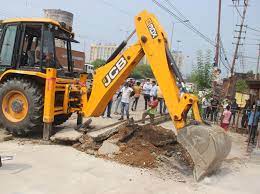India’s highways are death traps, network of the deadliest roads in the world, and despite numerous laws to safeguard motorists, two wheeler drivers and pedestrians yet NH accidents go on unabated. Fact is that National Highways and express highways form only 2 percent of roads in India yet they account for staggering 60% of all road accidents, a figure for serious analysis and immediate remedial measures. NH road networks consist of up to 12 lane roads, means express speed on certain highways. Modern day vehicles are fitted with mandatory air bags, ABS brakes and other safety features, thereby giving superficial sense of handling and security at higher speed which ultimately ends up with fatal accidents. Setting up of speed limits is a state issue as such local administration should be aware of ground realities. Main culprits being roadside dhabhas and other shops on encroached land or side lanes of NHs. Authorities turn blind eye to these encroachments and problem is so serious that almost every State/UT is facing Court cases over this issue. These road side shops don’t have any parking place at all resulting on road parking and thereby traffic chaos beyond control, risking everyone. Recently only, Himachal High Court passed an order to demolish all 472 shops on one particular NH. Temporary khokhas, reharis and concrete shops are part of local administration and encroachers nexus. Practically all unoccupied land is government land unless until claimed and proved by any person. MoRTH has rightly directed all states/UT to remove all these illegal roadside structures. Not only removal of these structures but other measures are also being in place utilising technology. One of these is to have an App for suggestions from commuters like where was the traffic congestion and what was the reason. Similarly utilising Toll Plaza data to observe average time taken between various two toll plazas and if any snarl observed, what is the reason and how to rectify it. Jammu and Kashmir NHs are no different as one can see rehari zone congestion opposite Garrison Church at Gandhi Nagar and all along NH from Kunjwani to Nagrota. Our NH-44 case is further complicated due to shooting stones, landslide and snowfall issues with kilometers long stuck up vehicles for days, particularly at these roadside dhabhas as per comfort and convenience of drivers. It is important to acknowledge that these truck movements are lifeline of Jammu and Kashmir. Keeping in view of this ‘Highway Village’ concept was introduced with 183 identified sites, one after every 50 kms in first phase, Rs20 crore was earmarked for it and 18 months timeline. The plan was to develop one pit stop of petrol pump, ample separate car/bus/truck parking, restaurant/food courts, low cost dhaba, telephone booth/ATM, minor repair workshop, clean toilets, separate restroom for drivers and passengers for short stays with proper landscape to refresh mind thereby reducing driving fatigue and in the process safe and comfortable driving and highway, one already there for Kathua but many more have to be built. Frequent traffic jams on NH means air pollution in the form of gases emission as well as increase in particle mass in shape of dust.
All said and done these roadside shops are only mode of employment for many, catering to multiple families from a single shop. Government has to come up a proper plan to develop proper legal infra alongside highway before removing all roadside shops. Shopkeepers, drivers particularly have to be taken onboard before on ground action. Serious efforts should be taken to have no encroachment on highways, in particular at parking/service lanes especially on NHs passing through cities. Stringent implementation of speed limits, particularly at vulnerable accident points. In the past Jammu administration had removed all roadside restaurants at highway along Sidhra. Cooperation from all is a must to make NHs safe but onus lies mainly with local administration.


